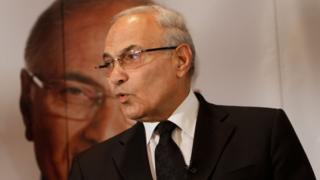Former Egyptian PM gives TV interview, denying he was kidnapped
The former Egyptian Prime Minister Ahmed Shafiq has given a phone interview on live TV, denying reports that he was kidnapped.
Mr Shafiq's family had voiced fears of foul play, saying they were unable to contact him after he landed in Egypt.
He was deported from the UAE on Saturday after five years in exile.
The deportation came after Mr Shafiq stated his intention to run for the presidency of Egypt in 2018. He said on TV he was now reconsidering the plan.
Mr Shafiq's family issued a statement on Saturday saying they had been unable to contact him after his arrival in Egypt.
Then on Sunday his lawyer, Dina Adly, released a short statement saying she had met Mr Shafiq in a hotel in Cairo.
"I had a meeting with Shafik an hour ago at one of the hotels in New Cairo and confirmed his health," Ms Adly, wrote on Facebook.
"He confirmed that his health was good and that he was not subjected to any investigations," she added.
- Paying the price for seeking freedom in Egypt
- Egypt's revolutionaries – where are they now?
Mr Shafiq fled to the UAE after losing the 2012 presidential election to Mohammed Morsi, who issued an arrest warrant for him on corruption charges.
Mr Morsi was later ousted by the military, and replaced by Abdul Fattah al-Sisi in 2014, while Mr Shafiq was acquitted of the charges.
President Sisi is widely expected to run for a second term, although he has not yet confirmed his candidacy. It is thought that Mr Shafiq may be his main rival in the poll.
Mr Shafiq was appointed prime minister in the final days of Hosni Mubarak's presidency in 2011.
He stayed in post just three weeks after the Egyptian revolution ended, when he was forced to step down because of his links to the ousted president.
Separately, another potential presidential candidate, Col Ahmed Konsowa, has been arrested, according to Egyptian media reports.
The colonel reportedly tried to resign from the military to make himself eligible to campaign for the presidency, but has had his request refused.
The Al-Mesryoon newspaper said he was arrested for an investigation into "publishing a politically-affiliated video and abuse of his military post".

